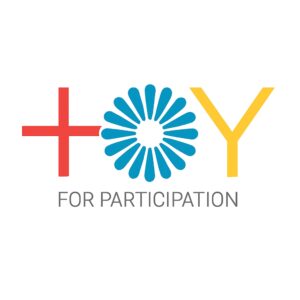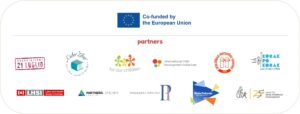Playing for participation
Why are we working with TOY4Participation? The TOY4Participation project aims to promote children's participation in early childhood education and care spaces and institutions. Recognising that the early years are crucial for the development of lifelong participatory practices, the project aims to fill gaps in existing child participation mechanisms, with a particular focus on enabling young children to participate as active decision-makers [...]
Why are we working with TOY4Participation?
The TOY4Participation project aims to promote children's participation in early childhood education and care spaces and institutions. Recognising that the early years are crucial for the development of lifelong participatory practices, the project aims to fill gaps in existing child participation mechanisms, with a particular focus on enabling young children to participate as active decision-makers in issues that affect them.
The project builds on the innovative model of Play Centres, which are community-based, inclusive, non-formal educational and participatory spaces for children and families, with a special focus on vulnerable groups such as migrants, refugees, Roma and children with special needs.
The project aims to promote meaningful participation at local level for children aged 0-10 from different backgrounds and vulnerable situations, and to make Play Centres, using the Play for Inclusion method, effective platforms for civic education, community participation and social transformation. The project aims to directly reach at least 2,400 children, 30% of whom are vulnerable.
What is the aim of the programme?
As part of the programme, a TOY4Participation (Playing for Participation) toolkit will be developed, which will include a theoretical framework and a variety of approaches and methodologies for early childhood that can be applied in non-formal and formal education, community and institutional spaces. The project also aims to ensure that the Play Centres, working with the Play for Inclusion method, have an impact on community and policy frameworks, ensuring that the participation of all children, especially those who are typically underrepresented, is integrated into local, national and European policies and educational practices.
Who do we work with and for?
- In each partner country, two or three Playing for Inclusion play centre professionals, volunteers
- Children attending two or three play centres in each partner country and their families, members of the communities around the play centre
- Children aged 0-10 years old, their siblings and families attending play centres
What do we do during the programme?
- We will collect and analyse good practices, develop a toolkit to establish and strengthen child participation processes
- Training professionals - we develop training material and methods, and expand the toolbox of professionals
- In a pilot phase, we will test the methodology in Play for Inclusion play centres in each partner country: designing initiatives, helping to implement, evaluating
- Dissemination: we organise knowledge-sharing events and awareness-raising campaigns to disseminate the method, to show the importance of child participation and its potential results
Duration of the project
The programme will run from January 2025 to December 2026.
How will the programme make the world a better place?
- A collection of international good practices on child participation is being developed
- Developing a training material to enrich the knowledge and practice of professionals working primarily with children on child participation
- The training material developed will help train professionals to introduce, expand and strengthen child participation processes and activities
- The method will be tested and introduced in play centres using the Play for Inclusion method
- Through dissemination, professionals working with children will learn about child participation methodologies and raise public awareness of the importance of strengthening child participation, showing tools to achieve this by involving very young children in the process
The professional partners involved in the project are all member organisations of International Step by Step:
1 ICDI (NL)
2 SKOLA DOKORAN - WIDE OPEN SCHOOL (SK)
3 IZGLITIBAS INICIATIVU CENTRS (LV)
4 PARTNERS HUNGARY FOUNDATION (HU)
5 PEDAGOSKI INSTITUTE (SI)
6 PUCKO OTVORENO UCILISTE KORAK PO KORAK (HR)
7 NGO 'Labor and Health Social Initiatives' (UA)
8 21 LUGLIO (IT)
9 INTERNATIONAL STEP BY STEP ASSOCIATION (NL)
10 FOR OUR CHILDREN FOUNDATION (BG)
11 CUBO LIBRO (IT)
Project co-financed by the European Commission.
The European Commission's support for this project does not imply endorsement of the content, which reflects the views only of the hosts, and the Commission cannot be held responsible for any use which may be made of the information contained therein.



